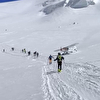Nanga Parbat: Walter Nones and Simon Kehrer safe in Base Camp

 1 / 4
1 / 4 Steve House
Steve House
Walter Nones and Simon Kehrer have done it! After 10 days on Nanga Parbat, of which two blocked at 6600m due to bad weather, the two Italian mountaineers have now managed to ski down to an altitude of 5700m from where they were picked up by helicopter and flown to Base Camp. During this entire, terrible ordeal Nones and Kehrer took all the right decisions, enabling them to escape from a truly difficult situation, both psychologically and physically. During this moment of great happiness though, the loss of Karl Unterkircher must surely remain at the forefront.
The event which has monopolised the entire Italian media has therefore drawn to a close in the best possible ways. An event with began on 15 July with the death of Karl Unterkircher, the mountaineer from Val Gardena who fell into a crevasse at circa 6400m while attempting a new route together with Nones and Kehrer up the difficult and dangerous Rakhiot Face on Nanga Parbat, the 9th highest mountain in the world.
News of the accident spread like wildfire on Wednesday 16th July. Walter Nones and Simon Kehrer had managed to get in touch with their families and the death of Unterkircher, an extremely capable Himalayan mountaineer, struck like lightening out of the blue. What made things even more difficult was the fact that Nones and Kehrer seemed unable to retreat since the section they had just climbed was too dangerous. To state that the situation was difficult is somewhat of an understatement, seeing that the mountaineers were engaged on one of the lesser known faces of Nanga Parbat, an 8000m peak infamous for its dangers.
Another detail worth considering is that high altitude mountaineering has always worked by an unwritten rule: those who climb the highest mountains in the world know they must be self sufficient, because a rescue on these immense mountains is always difficult, if not impossible. The only possible ray of hope might come from someone else engaged on the same route or the same face, but even in this case alpinists cannot rely on outside help. This holds true above all when, as was the case of Unterkicher, Nones and Kehrer, mountaineers plan to climb a virgin face where they are completely alone. All of this is, of course, not new to anyone.
Having said that, as everyone knows a rescue operation was mounted from Italy. On hearing the news Agostino da Polenza called Silvio Mondinelli and Maurizio Gallo, asking them to fly to Pakistan's Nanga Parbat. A nigh impossible mission, above all because both knew that without proper acclimatisation they would not have been able to climb and help the two mountaineers.
But Silvio Mondinelli, the iron man with a heart of gold who has climbed all fourteen 8000ers, has been involved in numerous rescues in the past and is a member of his local mountain rescue service. He simply could not say no. Just like Maurizo Gallo, the engineer and mountain guide from Padova who is vastly experienced in expedition logistics in Pakistan - one mustn't forget for example that he was one of the first westerners to reach Pakistan after the earthquake in 2005. Their decision was certainly courageous: it is not easy to be responsible for an operation which has more questions than answers, nor is it easy to say no and wonder whether things could get worse.
The fact is that on 18 July Mondinelli and Gallo reached base camp of the Rakhiot face. On 19/07 they organised two helicopter flights and managed to lower a satellite phone, food and gas to the two mountaineers at circa 6800m. One thing became clear immediately: a helicopter rescue was out of the question. Nones and Kehrer would have to descend at least 400m, but despite the satellite phone they could not make contact. Weighing up their options, Nones and Kehrer then took their decision: they decided to climb upwards, towards theonly line of escape. This proved the correct decision as they managed to reach the lip of the Bazin glacier and then the glacier at 7200m on 20 July. From there they had two possible lines of descent: either via the line chosen by Hermann Buhl during the first ascent in 1953, or down the "normal" Kinshofer route.
American and Iranian expeditions engaged on the Kinshofer had left tents and food to help the Italian climbers. But Nones and Keher chose otherwise: they descended via the Buhl route, as originally planned. Once again this decision proved correct: they had previously deposited a camp at 6400m and they had also climbed with skis to facilitate their descent. But bad weather then hampered their plans: on 21 July they were at 7000m, on 22 July at 6600m while on 23 July they remained blocked in their tents. Today the happy epilogue, in merrely an hour Nones and Kehrer skied down a line which, as things stand, seems independent of the Buhl route. After having overcome the two large crevasses, one of which by abseil, they reached 5700m. Here a helicopter sent by Gallo and Mondinelli picked them up, helping them avoid the tortuous glacier. So now, after 10 long days on the wall, they are finally safe in Base Camp.
Today is a happy day for everyoine. For Walter Nones and Simon Kehrer the odyssey has finally come to an end, an odyssey during which, we must repeat, they behaved like expert mountaineers, exiting on their own accord. But it is certainly also a happy day for Maurizio Gallo, Silvio Mondinelli and Agostino Da Polenza who have been relieved of a heavy responsibility. And it's a happy day for all mountaineers.
It's highly likely that much will still be said about this turn of events in the mountaineering world. A world which does not appreciate mainstream headline news which, in this case as well, use and abuse the age-old killer mountain Leitmotiv. But this is nothing new: this is the "game" the mainstream media plays. Even if hearing the voice of Nones, practically live via internet, speaking via satellite phone with the outcome still everything but certain, did not seem correct. But this is probably just a minor detail. What counts is that at least Walter and Simon are safe.
What remains is the memory and pain for the loss of Karl Unterkircher, a man held in high esteem by many. And what remains is the acute awareness of the dangers of this high altitude world, above all when mountaineers attempt to explore those boundaries where risk is no longer manageable, other than by fate. It's an age-old theme, as old as mountaineering itself, but once again climbers have to be strong enough to deal with it and be aware of it, in a matter-of-fact, serene manner. And Karl Unterkircher, with the final message he left online prior to setting off on his last adventure, can help us in this direction.
| Planetmountain | |
| News Nanga Parbat | |
| News Unterkircher | |
| www | |
| www.karlunterkircher.com | |
| www.montagna.tv | |



 Copia link
Copia link























